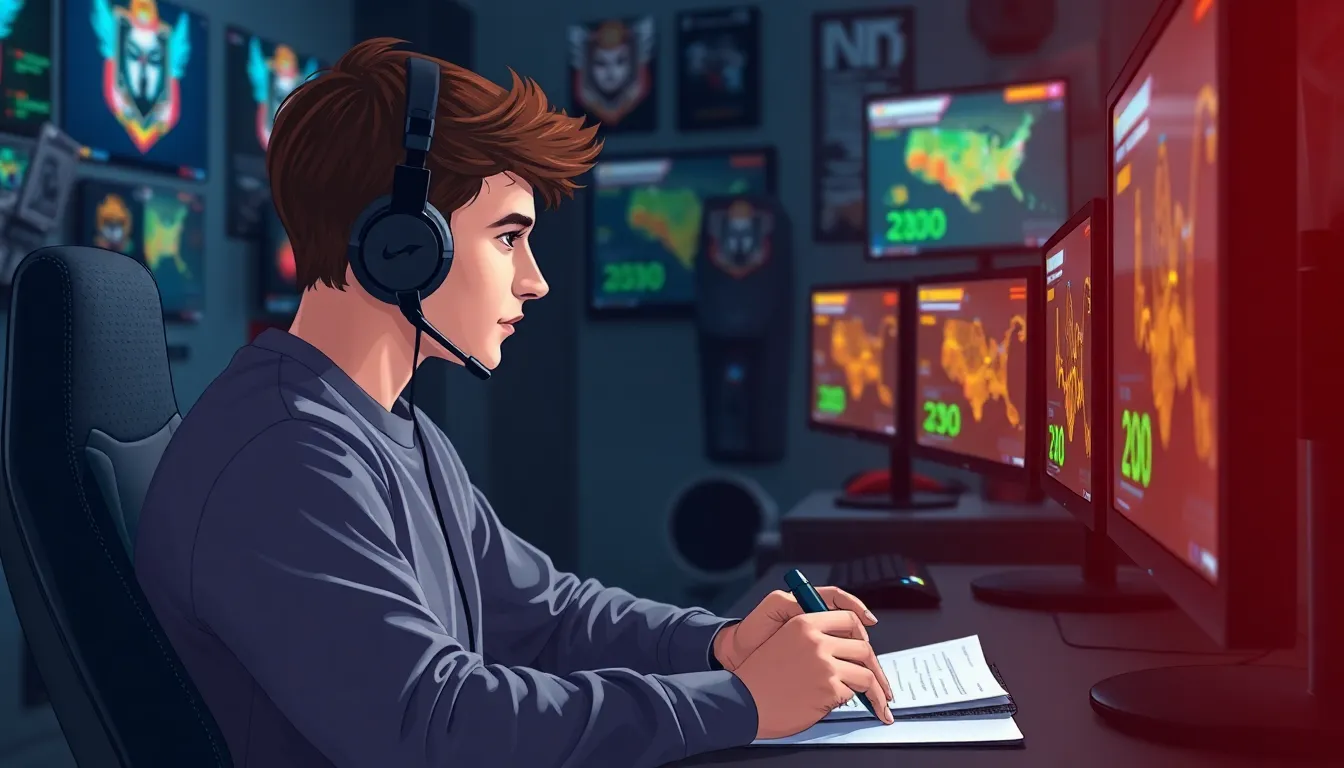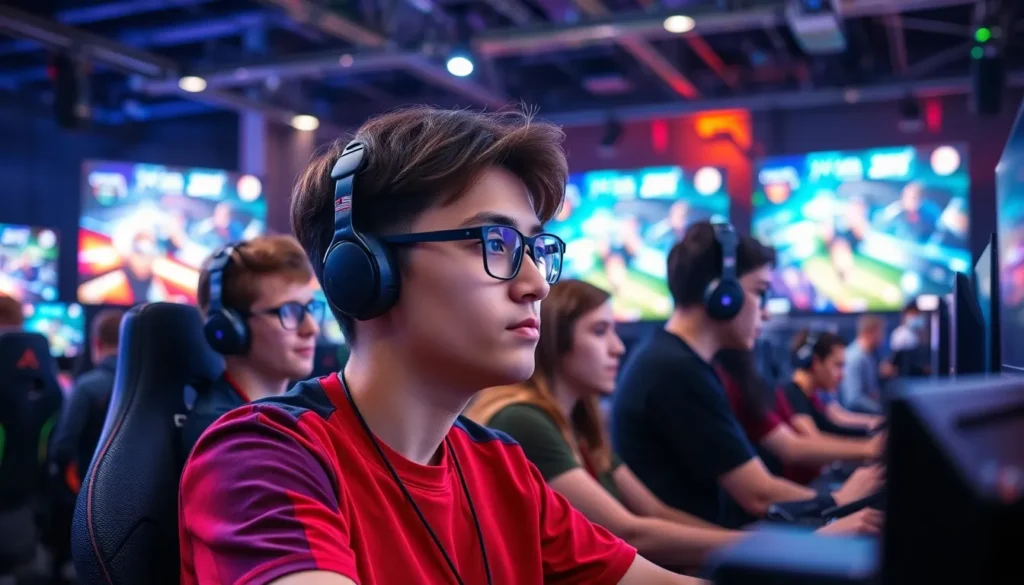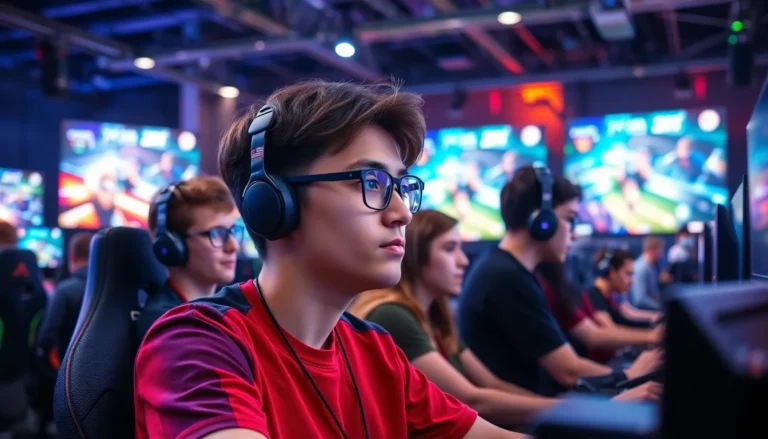Table of Contents
ToggleIn the fast-paced world of esports, having a top-notch coach can mean the difference between victory and defeat. It’s not just about knowing how to frag your opponents; it’s about strategy, teamwork, and a sprinkle of that special gaming magic. An esports coach is like the wizard behind the curtain, guiding players through the chaos and helping them level up their skills while avoiding those pesky pitfalls.
Imagine having someone who not only understands the game but can also turn your team into a well-oiled machine. They analyze gameplay, provide invaluable feedback, and sometimes even serve as the ultimate hype person. With the right coach, players can unlock their full potential and maybe even achieve their dreams of esports glory. So, if you’re ready to take your game to the next level, it might be time to consider the power of an esports coach.
Understanding the Role of an Esports Coach
An esports coach significantly impacts a team’s performance and overall success. The coach not only possesses game knowledge but also enhances strategy, teamwork, and player development.
Importance of Coaching in Esports
Coaching in esports improves player skills and team dynamics. Coaches analyze gameplay, identifying strengths and weaknesses that players may overlook. Studies show that teams with dedicated coaches outperform others by roughly 25%. Effective coaching fosters communication among players, promoting a positive environment crucial for growth. Furthermore, skilled coaches adapt strategies to counter opponents, ensuring teams stay competitive in ever-changing scenarios.
Key Responsibilities of an Esports Coach
An esports coach focuses on strategy formulation and execution. They review game footage, providing players with actionable feedback to refine techniques. Preparation for matches is essential; coaches design practice routines tailored to team needs. Coaches facilitate team meetings, addressing performance issues and discussing in-game decisions. They also mentor players on mental resilience, helping them manage pressure during high-stakes situations. Establishing a positive team culture stands as a core responsibility, fostering trust and collaboration among team members.
Skills Required to Become an Esports Coach

An effective esports coach possesses a blend of technical and soft skills essential for guiding teams towards success.
Technical Skills
Knowledge of game mechanics is crucial for an esports coach. Coaches must analyze strategies and gameplay to provide relevant insights. Familiarity with specific titles enhances their ability to instruct players accurately. A grasp of analytics tools facilitates performance tracking, enabling data-driven decisions. Understanding in-game dynamics and character strengths is also important for developing winning strategies.
Soft Skills
Communication stands out as a vital soft skill for a coach. The ability to provide clear feedback boosts team cohesion and morale. Coaching requires patience, as skill development takes time. Empathy also plays a critical role, allowing coaches to connect with players on a personal level. Moreover, motivational skills inspire players to push their limits and foster resilience during challenging moments.
Training and Development for Esports Coaches
Training and development are essential for esports coaches to enhance their effectiveness. Coaches adopt various methods and approaches to maximize player performance.
Coaching Methods and Approaches
Coaches often utilize diverse strategies tailored to individual player needs. Observational feedback helps in identifying strengths and weaknesses. One-on-one sessions allow for customized guidance, while group practices foster teamwork. Coaches may also implement game theories to enhance decision-making and strategic thinking. Incorporation of role-playing scenarios develops in-game adaptability. Additionally, data analysis provides insights into player performances, refining coaching tactics.
Continuous Learning and Improvement
Continuous learning is crucial for esports coaches, as the gaming landscape evolves rapidly. Engaging in workshops and online courses keeps coaches updated on the latest techniques. Networking with other coaches enables sharing of best practices and ideas. Regularly reviewing gameplay footage enhances analytical skills and identifies growth areas. Seeking feedback from players promotes a culture of improvement. Coaches benefiting from mentorship can gain invaluable perspectives. This commitment to learning ensures that coaches remain effective in the competitive esports realm.
The Future of Esports Coaching
Esports coaching is set to evolve significantly, driven by technological advancements and changing dynamics in competitive gaming.
Emerging Trends
Artificial intelligence is making an impact in coaching. Coaches utilize AI tools for performance analysis, gaining insights that enhance player strategies. Data analytics continues to shape training regimens, enabling coaches to understand player behaviors and game outcomes. Virtual reality (VR) training scenarios also present opportunities for immersive practice experiences, allowing players to refine skills in realistic environments. Collaboration with sports psychologists is becoming more common, focusing on a player’s mental well-being. As these trends emerge, they will redefine the coaching landscape, fostering innovative methods to improve team performance.
Opportunities in the Industry
The demand for esports coaches is on the rise, opening various career opportunities. Organizations seek skilled professionals to develop talent and manage in-game strategies. Scholarships for esports coaching programs are increasing, providing educational paths for aspiring coaches. Additionally, partnerships between traditional sports teams and esports organizations are becoming prevalent, creating hybrid roles. Players also recognize the value of mentorship, thus increasing the need for coaches who can guide them holistically. This growing landscape offers substantial potential for personal growth and career advancement in esports coaching.
The role of an esports coach is pivotal in shaping the future of competitive gaming. Their expertise not only enhances individual player skills but also cultivates a cohesive team environment. As the esports landscape continues to evolve with new technologies and methodologies, the demand for skilled coaches is set to rise.
Investing in effective coaching can significantly impact a team’s success and overall performance. With a blend of technical knowledge and essential soft skills, coaches are well-equipped to guide players through the complexities of the game. As players increasingly seek mentorship and support, the opportunities for growth in this field are vast, promising a bright future for aspiring esports coaches.







